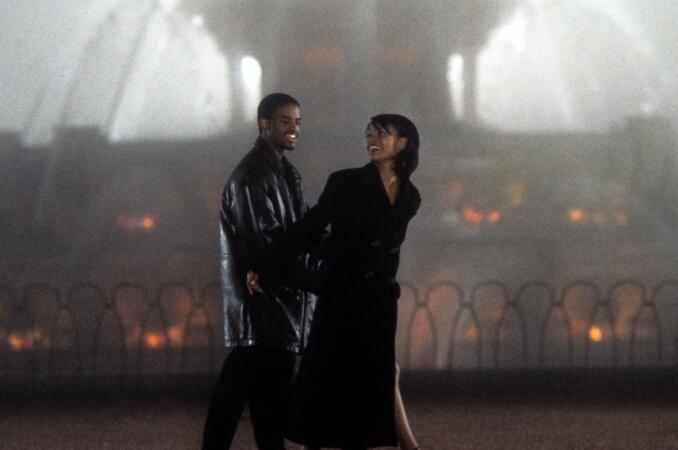
The Academy of Motion Picture Arts and Sciences has announced today the event “In the Mood for ‘Love Jones’ – The Academy Celebrates the Film’s 20th Anniversary.” The Academy will host a special screening of director Theodore Witcher’s “Love Jones” on Tuesday, June 13, at 7:30 p.m. at the Samuel Goldwyn Theater in Beverly Hills. The evening will reunite stars Nia Long, Larenz Tate and Isaiah Washington, and feature a panel discussion with Witcher and others.
More information coming later…
We celebrated the film’s 20th anniversary earlier this year with the piece that follows.
The other night, I came across a photograph of actress Lupita Nyong’o and actor Michael B. Jordan together on Twitter, with the caption: “A romantic comedy we’d all love to see.” Several users commented, and retweeted it. The actors’ beautiful brown faces burst from the image, and I became excited in a rare way.
I immediately thought of their faces together in a profile shot, natural light falling onto their skin as they embrace by a window or near a lake. I thought of an argument between them that ends in a kiss, or the dreaded obstacles that stop them from being together. And what about their first date at a popular diner, then dancing afterward, or maybe swimming? The thought of Michael B. Jordan and Lupita Nyong’o dancing together in a film makes me happy. It makes me happy because I don’t see many love stories like this.
Black moviegoers often speak of Theodore Witcher’s romantic drama, “Love Jones,” as an example of the classic black love story. Is there no contemporary equivalent to this film, and does there need to be? When black love is made mainstream, I am often encouraged to laugh at it. In “Think Like a Man,” when Morris Chestnut’s character unexpectedly pulls up in a Benz after Michael Ealy pulls off in that broke-down hooptie, I was in stitches. There is nothing wrong with laughter, and good comedy is priceless. But what if we want to laugh, cry, and think, in one sitting? What if I want to be made uncomfortable sometimes, through shot duration, moody lighting, or silence? What if the form of black love films could be expanded?
I think of some of the best love stories, like Jane Campion’s film “The Piano,” and how Ada ran through the murky New Zealand forest in muted grays and thick fog, to be with Baines. An unfamiliar lust and passion overcame them, and a beautiful union was forged. I also think of more recent films like Terence Nance’s “An Oversimplification of Her Beauty,” and how Nance’s adoration of Namik formed a surreal, enchanted cross-genre blend of animation, live action, and sound that channels the feeling of wanting and not being wanted in return.
I think of Ava DuVernay’s film “Middle of Nowhere,” and of Emayatzy Corinealdi as Ruby, a brown-skinned woman with a round face, fierce eyes, and an expectation for her husband’s eventual release from prison. She looked different than many of the black female leads I’d seen, and this excited me because I look different than many of the images I constantly ingest. She was a reflection of black women we don’t see, women who come home from work, tired, and sit in a dark room, or go to sleep in the middle of the day. There was a lived-in quality to these scenes, and to this character.
In just about every public appearance, Lupita Nyong’o astonishes the world with her smile, humility, physical beauty, her cropped haircut, dashing gowns, and her smooth, dark brown skin. She is not the black female protagonist I see in mainstream films, and it’s because of this, that she’s needed there. Aside from talent, a large part of any romantic genre film, has to do with the look of its lead actors. As viewers, we want to fall in love too. Who wouldn’t want to look at Lupita Nyong’o and Michael B. Jordan for two hours? Is that even a question?
Both actors have stepped into the spotlight for humanizing characters on the bottom rungs of society. Oscar Grant was an unfaithful boyfriend and loving father killed on New Years Eve, while Patsey, a female field-hand, picked more cotton than any man, but faced constant brutality from the plantation owner. Both roles required total commitment to the vulnerability in these heavily contested spaces, and both performances aroused audience emotion, causing us to wonder about Patsey and Oscar Grant for days and months afterward, and to leave the theater with a full heart. Can you imagine what they could do in a love story?
So, will we ever see this film? I hope so. And, what would be the obstacles to getting it made? The same systemic obstacles that prevent any Octavia Butler novels from being adapted into films, or kept Theodore Witcher from making another film after “Love Jones.” The same reasons that prompted Viola Davis to speak about the lack of roles offered to her, and why certain young, talented actresses like Adepero Oduye and Emayatzy Corinealdi, aren’t racking up roles left and right like their white counterparts.
It’s difficult to do or be something different, when popular systems of preference and importance are built on foundations that don’t include you, your image, or your idea of love. When black men and women’s lives can be so easily extinguished in our own society, it becomes hard to think about Hollywood embracing an organic love story between a black woman and a black man, or between a black woman and a black woman. So, that leaves us- the independent black filmmakers and supporters- to love, to make different images, to evoke passion, to write a movie for Lupita and Michael, and others like them. I’m starting now.
Nijla Mu’min is a writer and filmmaker from the East Bay Area. She is currently in development on her feature film debut, “Jinn.” Visit her website here.
